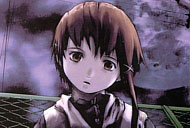
Serial Experiments Lain
There are a few very wonderful moments in a reviewer's life when one sees something that completely defies the boundaries of art as it exists and expands into new territory. These shows and films redefine the way we look at things. Sometimes we ignore them, pass them off, or otherwise denigrate them...but they are landmarks. 2001, Star Wars, Pulp Fiction, Akira, perhaps the new film The Blair Witch Project...all of them are movies that shattered what could be done within a genre, and all of them are seen in a special light. I believe Serial Experiments Lain is such a film for anime. It has the conceptualization of The Matrix with the subterfuge plotting of Jacob's Ladder and Dark City, combined with art and sound that redefine what anime can actually be.
To give too much detail is to spoil the experiential nature of Lain: one must see it to truly understand, and it really is impossible to explain well. (I tried to do so to my wife, and got more confused doing so.) All you need to know about the plot is this: Lain is a waif of a creature, not social or well-liked, whose family is kind but not particularly understanding. A girl at her school apparently commits suicide, but there's something peculiar about it all...after her death, she writes to Lain via the Wired, an Internet-style conglomeration that connects the world, and lets her know she is still alive. Lain is somehow intrigued by this, and as she delves further into the world known as the Wired to find out more, her whole person changes...and maybe she's not really who she always thought she was.
If this is vague, simply take it at face value. The show is not easy to understand or always follow, but it is at turns quirky, compelling, and strangely tantelizing. The artwork is exceptionally done for a television show, and it is completely unique. Although the character designs are vaguely reminiscent of Neon Genesis Evangelion, they still stand out. The story itself is told through art, and it is wild. Although there is nothing groundbreaking in the actual artwork itself (i.e. CGI), the conceptualization of this world is captured completely. It is strange and bizarre, yet it works to portray this new, strange world. Everything about the show was excellent.
To be honest, my webmaster and I sat down at 10:00pm or so to just watch the first episode to check out the DVD. Two hours and 4 episodes later, we were astounded. The next two volumes in the series have already been ordered...and if it continues in this vein, this may be just about the best anime I've seen in years. I believe it may take some effort--since the series promises to be difficult to understand--but the first installment of Lain pulls you in and never lets go.
Serial Experiments Lain Vol. 1: Navi -- violence, adult situations -- A+
If there is one show I have hyped to my friends recently, it's been Serial Experiments Lain. There is no other anime show that I know of on the American market that so wonderfully combines the elements that Lain does. It is so unique, it is so difficult to describe, that I'm not sure reviewing it does it justice. It is a must-see.
Volume 2 of the series incorporates three episodes of the television show as Lain gets further involved with the Wired, the strange world of electricity and technology that hovers almost parallel to our own. This trip is even stranger than the last, though...the first episode revolves around Lain's sister, and it is seriously demented. I am certain sections of that episode (called "Distortion," appropriately) will only make sense near the end of the series. However, the next two do bring a little bit of order to all the chaos as we start to get clues and hints as to who Lain really is and why she is so important. It's all kind of smoke and mirrors, though, in that none of it really makes a whole lot of sense yet.
Lain is very close in the theoretical sense to The X-Files in the way that both shows leave so much information out so that the viewer (and the characters) have to sort it out for themselves. What X-Files doesn't have, however, is the overwhelming presence of Lain. It is gorgeous, still, and very crisp (especially on DVD). It is masterful storytelling. The only caution I would give is that the show continues to leave you hanging, and the final two installments are not due out until October and November of 1999. Thus, those who have little tolerance for the unexplained might wait until the series is complete. Hopefully then, everything will fit together nicely. My rating has only gone down one small notch on this release, and that's primarily due to the fact that I was hoping for a little bit more clarity at this point in the series. Don't take that as bad, though...so far, I love it.
There are some series that you never want to see go, and others that wear out their welcome before they go away. Lain ends at just about the perfect time--a point where you have had just about enough of the mysteries underlying the series but were still fascinated by the premise. For those who haven't read the previous entries, Lain has followed the titular character's journeys through a form of cyberspace known as The Wired. As the story progressed, Lain becomes more and more uncertain of the difference between the real world and the Wired one, and the audience is dragged along through the madness.
It's quite difficult to give a satisfying review of the show, since I don't want to give anything away, but I can tell you this much...Lain finds out who she is and what her relationship to the Wired is. She makes some decisions that will literally shake the world as we perceive it. She will deal with the gods and demons of the Wired, and the audience watches in stunned silence as the series ends.
The reason why Lain is so good as a series and why it will stand up over time is because, even in its ending, it preserves a sense of mysterious awe about the technology mankind is prone to create. The ending of Lain can be taken a multitude of ways, some of which I'll discuss in a moment. It certainly won't satisfy everyone--even I was hoping for a bit more in terms of explanation--but it does bring closure to the series, and the main storyline is resolved. Frankly, I've not seen anything so visionary in quite some time. The more layers you tear away to understand the show, the more layers appear for you to ponder.
To conclude the main review, see Lain right away. Don't see it with a group of people expecting an actionfest or a comedy. It's best watched with an open mind with others who will at least appreciate a serious drama that isn't easily understood. If you don't fit that bill yourself, maybe you should skip it, but rent the first episodes anyway. You need to see what you are missing.
Serial Experiments Lain Vol. 3: Deus & 4: Reset -- mild language and violence -- A
Warning: The following is a somewhat controversial discussion of the key mysteries in Lain. Major spoilers are included. It's invisible until you highlight the text for the sake of those who haven't yet seen the show.
[Highlight]> It's one thing to have seen Lain, but it's another thing entirely to understand it. Although there are many veins of thought about the series, I thought that it would be interesting to discuss Lain along the prevalent theme my web designer and I picked up when viewing the final episodes. What did we see in this? Quite simply, Lain is a cyber equivalent of the Christ story, with a few minor revisions and changes. Before you throw me out entirely, let me explain that point of view:
1. Lain was omnipresent in The Wired before she ever recognized her physical existance. This follows along the lines that Christ was with God and was God since the beginning of time, as found in the Biblical book of John.
2. At some point, whether because of her own decision, the decision of the "god" of the Wired, or something else, she becomes flesh and takes a body in the "real" world. This is the essense of Christ in the scriptures, as God made flesh.
3. At the beginning of the show, we see a girl commit suicide in order to become a part of the Wired herself, without any boundaries. Although the Judeo-Christian value set regards suicide as an evil, Japanese thought does not. It could even warrant that within the Japanese viewpoint, if one could be certain of joining God (or "kami", spirits/gods) and guiding society correctly by committing suicide, it might be honorable. Regardless of the outlook, the spiritual concept that the body is just a shell for the soul and the vague contempt for the trapping of the body is clear.
4. Lain is intended to be the ultimate bridge between the "real" world and the "cyber" world. Christ is supposed to be the bridge between God and man. The catch within the show is that Lain realizes that the power she has in the "real" world would eventually cause people to die (or, at very least, sever their ties with their physical bodies). At the end, she removes herself from everyone's memory in order to save the world. Whether or not the bridge between the two worlds remains, she still is a savior.
5. As we see the final ending, it is clear that Lain will live on forever within the Wired, and that she will always be a part of things even if she is not remembered. This is not unlike the concept of the Holy Spirit within Christian belief. Now Christ and the Holy Spirit are separate in religious belief, but in Lain the difference does not need to be made.
Now there are certainly arguments to this, and I would agree with many of them. Certainly Lain as a character does not show many other Christ traits, but that is really not necessary. The parallels still exist, and they are very interesting. Even if all of this is conjecture, it points to the power of Lain as a series to be able to make one think about these things and to examine one's thoughts so thoroughly.
If you have other theories behind the "true meaning" of Lain, please let me know. I'll include any serious replies as part of a future update to the review.

